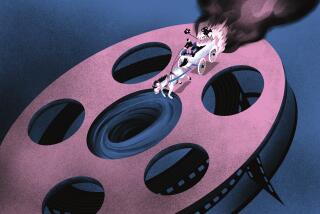‘Hobbit: The Battle of the Five Armies’ a flawed finale, reviews say
“The Hobbit: The Battle of the Five Armies” marks the end of a long journey for Bilbo Baggins — and the end (presumably) of an even longer journey for “Hobbit” and “The Lord of the Rings” director Peter Jackson, who has spent six films in the world of J.R.R. Tolkien.
According to reviews, “Five Armies” is a flawed but fitting finale to the “Hobbit” trilogy, sharing many of its predecessors’ faults but also wrapping things up with some rousing spectacle.
The Times’ Betsy Sharkey is among the critics who say the film is unwieldy. She writes, “Five armies are too many. Within minutes of the first assault, ‘The Hobbit’ battlefield begins to look like an out-of-control Comic-Con after-party. As orcs, wargs, bats, elves, dwarfs, eagles and Lake-town citizens go at each other, you have to wonder who is doing the math.” She adds that “the title of the film could just as easily have been ‘The Hobbit: The Indecision of the Five Endings.’”
On the other hand, Sharkey says, “The finale is not an all-out disappointment. It should satisfy the franchise’s fans, and it does wrap up any loose ends you might be wondering about.”
The New York Times’ Nicolas Rapold writes that “Part of the problem with Mr. Jackson’s accordion-expanded ‘Hobbit’ is just that gravitational pull: At the film’s core is not really the engaging Mr. [Martin] Freeman as Bilbo, ever twitchingly alive, as you might expect.” As the titular clash builds, “Jackson’s massed set pieces shift between stirring visual salvos and general panoramic swarming.”
Alas, Rapold says, “For all the craft, there’s nothing here like the unity and force of ‘The Lord of the Rings,’ which is positively steeped in mythology and features (wonder of wonders) rounder characterization than the scheduled revelations on display here.”
USA Today’s Claudia Puig offers a more positive review, writing, “The final installment of the ‘Hobbit’ trilogy is the best, featuring more spectacular action scenes as well as the series’ most emotionally resonant moments.”
While Jackson “frustratingly … continues to indulge his love for multiple endings,” on the whole the film “offers visual dazzle, epic contests, genial humor and moments of great sadness making for an altogether fitting conclusion to this saga of Middle-earth.”
New York magazine’s Bilge Ebiri disagrees. He writes, “This third installment of ‘The Hobbit’ trilogy is allegedly the shortest of all of Peter Jackson’s Tolkien films, but my theater must have been orbiting a black hole because I could swear it swallowed up 20 years of my life. Maybe it was all that slow-motion. Or maybe it was the fact that, more than any of the other films in Jackson’s ill-advised (but ridiculously lucrative) trilogy, ‘The Hobbit: The Battle of the Five Armies’ feels thoroughly inconsequential — a bloated, portentous mess that, in a just world, should not exist.” That’s just the first paragraph, and things don’t get better for “Five Armies” from there.
The San Francisco Chronicle’s Mick LaSalle is more measured. He writes, “‘The Hobbit: The Battle of the Five Armies’ is the best of the three ‘Hobbit’ installments, in that it’s not horrible. Yet even it suffers from the same disease as the first two entries. It takes a slender story — just a third of Tolkien’s average-size book — and stretches it beyond sense. The climactic battle scene, for example, seems to go on for almost an hour. Do you know how many dead orcs you can pile up in an hour?”
On the other hand, “there are good things in ‘Five Armies’ that distract from the ordeal and even, occasionally, provide actual pleasure.… It is more visually rich than the second film. Martin Freeman, the title character and the movie’s chief asset, gets more screen time. And the story is actually heading somewhere, toward a genuine conclusion.”
The Village Voice’s Alan Scherstuhl perhaps puts it best, writing, “Reviewing any chunk of Jackson’s Tolkien-flavored fantasy-combat-simulation project is like reviewing some holiday party or a possibly obligatory family get-together. You know whether you’re going, you know who you’ll see there, and you know that you’ll either grit through it and be glad when it’s over, or you’ll lose yourself in it and miss the ritual when it’s gone. “
In the end, Scherstuhl says, “You may carp that it’s all just too much. But it’s hard not to marvel at just how much too-much Jackson has whipped up — and how much of it was inspired.”
Follow @ogettell for movie news
More to Read
Only good movies
Get the Indie Focus newsletter, Mark Olsen's weekly guide to the world of cinema.
You may occasionally receive promotional content from the Los Angeles Times.






